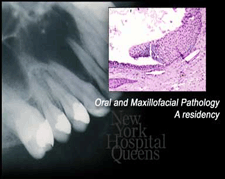المقالات
Aphthous Ulcers

Aphthous ulcers - commonly known as canker sores - are small, painful sores that occur on the oral mucosa (the pink tissue that lines the inside of the mouth). They are the most common ulcer that affects the mouth, yet their cause is unknown. Many factors point to an allergic reaction as a possible cause; toothpaste ingredients (specifically sodium lauryl sulfate, or SLS), flavoring agents in food, and mouthwashes have all been identified as common allergens. Some people also experience severe episodes of aphthous ulcers during stressful periods. Typically, the ulcers are small (less than the size of the tip of a pencil eraser) and are most common on the inside of the cheeks or lips, the 'valley' between the lips and the gums, and on the tongue. They can occur at any age, but are most common in those between 20-40 years of age. They also tend to be more common in females.
Aphthous ulcers often develop in a cyclic pattern, and heal without scarring within 10-14 days. Generally, they have to run their course, although there are a few products available that can temporarily relieve the discomfort produced by these mouth sores. You should avoid acidic foods and beverages, like orange juice and tomatoes, until the ulcers subside; it can be very painful when the ulcers come in contact with acidic substances.
Prescription mouth rinses that contain tetracycline (an antibiotic), Benadryl (an antihistamine), and cortisone, either used individually or in combination, have been beneficial for some people, but their effectiveness is unpredictable and does not last.
Supplemental vitamins and minerals, such as vitamin B12, iron, and zinc, have been used with mixed results. Over-the-counter treatments are available that can alleviate some of the discomfort associated with aphthous ulcers. They either numb the area, or place a protective film over it.
